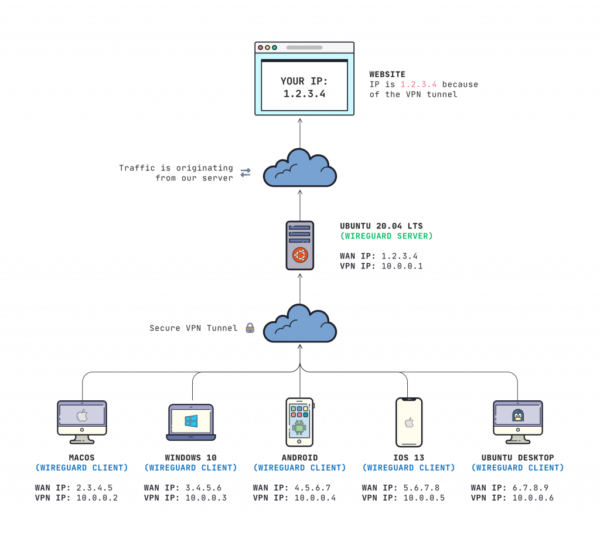Brief Information about WireGuard
WireGuard is a cutting-edge VPN (Virtual Private Network) protocol designed to offer enhanced security, simplicity, and performance compared to traditional VPN protocols. It was developed by Jason A. Donenfeld and first released in 2016. Since then, it has gained significant attention and adoption within the cybersecurity community due to its innovative approach to VPN technology.
Detailed Information about WireGuard
WireGuard operates on the principle of simplicity and minimalism, aiming to provide a lean yet highly efficient VPN solution. Unlike older protocols such as OpenVPN and IPsec, WireGuard is built with a streamlined codebase of just over 4,000 lines, making it easy to audit and maintain. Its lightweight design contributes to faster connection times and lower overhead, resulting in improved performance on both desktop and mobile devices.
One of the key features of WireGuard is its use of state-of-the-art cryptographic algorithms, including Curve25519 for key exchange, ChaCha20 for encryption, and Poly1305 for authentication. These algorithms are known for their robustness and resistance to attacks, ensuring that data transmitted over WireGuard connections remains secure.
Moreover, WireGuard is designed to be easily deployable and manageable, with support for automatic key exchange and dynamic routing. Its configuration is straightforward, typically requiring only a handful of lines compared to the complex configurations needed for other VPN protocols. This simplicity reduces the likelihood of misconfigurations and enhances overall usability.
Detailed Analysis of the Key Features of WireGuard
| Feature | Description |
|---|---|
| Simplicity | WireGuard boasts a minimalistic codebase, making it easy to audit and maintain. |
| Security | Utilizes modern cryptographic algorithms to ensure the confidentiality and integrity of data. |
| Performance | Offers improved performance and lower latency compared to traditional VPN protocols. |
| Ease of Deployment | Simplified configuration and automatic key exchange facilitate easy deployment and management. |
| Cross-Platform | Supports various operating systems, including Linux, macOS, Windows, iOS, and Android. |
Types of WireGuard
WireGuard primarily exists as a VPN protocol, but it also serves as the foundation for various implementations and applications. These include:
- Official WireGuard Implementation: The core WireGuard protocol maintained by Jason A. Donenfeld and the official development team.
- Third-Party Implementations: Various third-party projects have implemented WireGuard for integration into their software or services.
- Custom Deployments: Organizations and individuals can customize WireGuard to meet their specific needs and requirements.
Ways to Use WireGuard
WireGuard can be utilized in a variety of scenarios, including:
- Secure Remote Access: Enables users to securely access private networks and resources over the internet.
- Privacy Protection: Protects online privacy by encrypting internet traffic and masking IP addresses.
- Bypassing Censorship: Helps bypass internet censorship and access restricted content from anywhere in the world.
Problems with WireGuard and Solutions
While WireGuard offers numerous benefits, some challenges may arise during implementation:
- Compatibility Issues: Compatibility issues may occur when integrating WireGuard with existing network infrastructures. This can be addressed through thorough testing and configuration adjustments.
- Security Concerns: Despite its strong security features, vulnerabilities may still arise. Regular updates and patches can help mitigate security risks.
- Performance Optimization: Performance issues may arise in certain network environments. Tuning network settings and optimizing configurations can help improve performance.
Main Characteristics and Comparisons
| Characteristic | WireGuard | OpenVPN | IPsec |
|---|---|---|---|
| Complexity | Minimalistic codebase | Complex configuration options | Varies depending on implementation |
| Security | Modern cryptographic algorithms | Established encryption standards | Industry-standard encryption |
| Performance | Low overhead, fast connection times | Moderate performance impact | Performance varies based on configuration |
| Ease of Deployment | Simple configuration, automatic key exchange | Requires extensive configuration | Complex configuration and management |
Perspectives and Future Technologies
As technology continues to evolve, WireGuard is expected to remain at the forefront of VPN innovation. Future developments may include:
- Integration with emerging technologies such as blockchain for enhanced security and decentralization.
- Support for advanced encryption techniques to combat evolving cyber threats.
- Expansion into new use cases and industries, including IoT (Internet of Things) and edge computing.
VPN and WireGuard Integration
WireGuard can be seamlessly integrated into VPN services, offering users enhanced security, privacy, and performance. VPN providers can leverage WireGuard to deliver a superior VPN experience to their customers, ensuring secure and reliable connectivity across various devices and platforms.
Links to Resources
For more information about WireGuard, please refer to the following resources:
By leveraging the advanced capabilities of WireGuard, VPN users can enjoy a secure and efficient online experience, safeguarding their privacy and data in an increasingly interconnected world.


